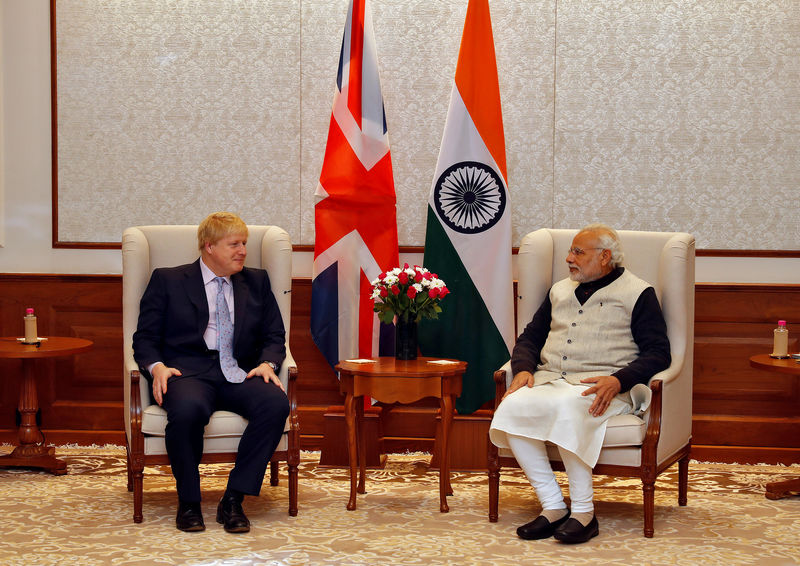By Douglas Busvine
NEW DELHI (Reuters) - Foreign Secretary Boris Johnson on Wednesday compared any attempt to punish Britain for leaving the European Union to a World War Two escape movie, saying both sides would do better to strike a mutually beneficial trade deal.
Speaking in New Delhi a day after Prime Minister Theresa May laid out the case for a "hard Brexit", in which Britain leaves the European single market, Johnson said attempts to curb free trade cut both ways.
He was answering a question on comments made earlier by an aide to French President Francois Hollande who said Britain should not expect a better trading relationship with Europe once it was outside the common market of 500 million people.
"If Monsieur Hollande wants to administer punishment beatings that anyone chooses to escape, rather in the manner of some World War Two movie, then I don't think that's the way forward," Johnson answered.
"It's not in the interests of our friends or our partners."
Johnson's comments to the Raisina Dialogue, a geopolitical conference hosted by the Indian foreign ministry and the Observer Research Foundation, will be scrutinised back home to see whether he is straying from May's message, delivered in a landmark speech in London on Tuesday.
In his prepared remarks Johnson - a leading face of the successful campaign to vote "leave" in a referendum last June - said Britain should embrace free trade not only with Europe but with the wider world.
"We want to be outside the cathedral but support it like a flying buttress," Johnson said, adding in an aside that he had been mistranslated when he had made the same remark in an earlier speech to say Britain wanted to be a "flying bucket".
Joking apart, the maverick Eurosceptic, who pulled out of the race to succeed premier David Cameron to clear the way for May, made several points underlining Britain's commitment to be a strong partner in Europe.
Britain believed in multilateral cooperation, he said, while the North Atlantic Treaty Organisation was the "cornerstone of our defence".
CASE FOR FREE TRADE
Johnson, 52, argued forcefully for free trade saying that it would help to create jobs for those who see their livelihoods threatened, many of whom voted for Brexit, while vast wealth accrues to a tiny but powerful global elite.
"They fear that they may be the first generation not to be overtaken in prosperity by their children," said Johnson. "I don't think these people should be patronised or dismissed."
The answer, he said, was not to put up barriers but to use the international system to benefit these people. The failure to do so would spell a return to the 1930s, an era of declining trade that ended in war.
Restricting market access "cuts both ways", Johnson said, pointing to the German car industry that exports a fifth of its production to Britain, and thinking aloud about the possibility of imposing a 10 percent import duty.
London, the British capital of which he was previously mayor, would not lose its status as a global financial centre even outside the EU, he added.
Turning to India, Johnson endorsed Prime Minister Narendra Modi's call for tension in the South China Sea to be addressed under a rules-based order and said Britain stood with India in its fight against terrorism.
But, complaining of the 150 percent import tariff India charges on Scotch whisky, he said it was time for Britain and Asia's third-largest economy to strike a free trade deal.
That won't be possible until after Britain leaves the EU, which must happen within two years of launching formal exit talks. But it would at least be possible to make a start.
"The time is fast upon us when we need to turbocharge the relationship in the form of a new trade deal," he said. "We can't do it now but we can sketch it out on the back of an envelope."

(This version of the story has been refiled to fix spelling to 'but' in paragraph 11)